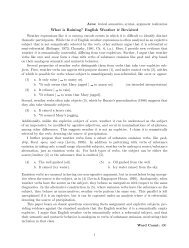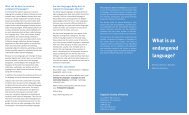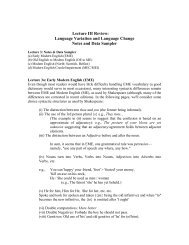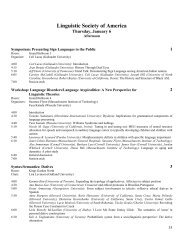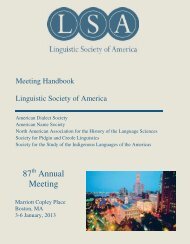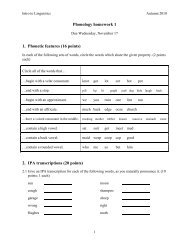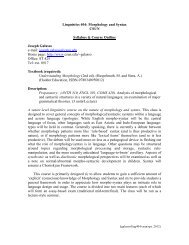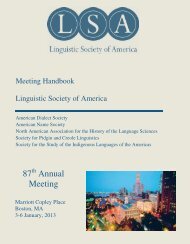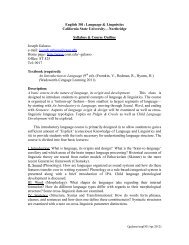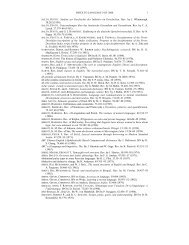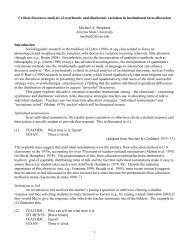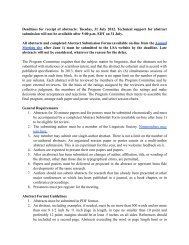Saturday, 6 JanuarySymposiumSemantic/Pragmatic Perspectives on Negative Polarity ItemsPacific B9:00 AM – 12:00 PMOrganizer:Participants:Discussant:Kimiko Nakanishi (University <strong>of</strong> Calgary)Elena Guerzoni (University <strong>of</strong> Sou<strong>the</strong>rn California)Laurence Horn (Yale University)Bernhard Schwarz (McGill University)Anastasia Giannakidou (University <strong>of</strong> Chicago)Over <strong>the</strong> past few decades, a substantial number <strong>of</strong> studies have been done on so-called negative polarity items (NPIs), words andexpressions restricted to occurring in <strong>the</strong> scope <strong>of</strong> negation and related contexts. One <strong>of</strong> <strong>the</strong> most fundamental questions is how tocharacterize <strong>the</strong> limited distribution <strong>of</strong> NPIs. More specifically, our tasks are to identify exactly when NPIs can be licensed and toexamine whe<strong>the</strong>r seemingly diverse NPI-licensing environments can be uniformly described. One <strong>of</strong> <strong>the</strong> most influential claims inthis context is that <strong>of</strong> Ladusaw 1979, which proposes that <strong>the</strong> class <strong>of</strong> NPI licensers can be unified in terms <strong>of</strong> a semantic property <strong>the</strong>yshare. In particular, Ladusaw claims that NPIs are licensed only in downward-entailing (DE) contexts, i.e., contexts whereentailments get reversed. However, this view has been challenged by various counter-examples presented in subsequent work (NPIslicensed in non-DE contexts, NPIs unlicensed in DE contexts). To account for cases that are problematic for <strong>the</strong> DE analysis,Giannakidou 1998, restoring <strong>the</strong> credibility <strong>of</strong> <strong>the</strong> semantic account, argues that a set <strong>of</strong> licensers should include not only DEexpressions but also expressions that are nonveridical. This analysis successfully accounts for NPIs licensed in non-DE contexts,which are problematic for <strong>the</strong> DE analysis. It remains to be seen whe<strong>the</strong>r this conservative extension <strong>of</strong> DE is able to account for <strong>the</strong>whole range <strong>of</strong> data on NPIs.A second question immediately following from <strong>the</strong> licensing question is why NPIs are restricted in <strong>the</strong>ir distribution. Under <strong>the</strong> DEanalysis, <strong>the</strong> question is why DEness has anything to do with <strong>the</strong> distribution <strong>of</strong> NPIs. Some researchers argue that NPIs introducealternatives or trigger a domain extension, which leads to a less informative statement in affirmative contexts (Kadmon & Landman1993, Krifka 1995, Chierchia 2004). Given a pragmatic requirement <strong>of</strong> being as informative as possible, this analysis explains whyNPIs are unacceptable in affirmative contexts. In contrast, in <strong>the</strong> environments where entailments get reversed (i.e., DE contexts),NPIs lead to a more informative statement, accounting for <strong>the</strong>ir connection to DE. Although this line <strong>of</strong> research on scalarsemantics/pragmatics provides an explanatory <strong>the</strong>ory <strong>of</strong> <strong>the</strong> correlation between NPIs and DEness, it is not without problems; for onething, DE may not be <strong>the</strong> right characterization <strong>of</strong> NPI licensers, as pointed out above. Fur<strong>the</strong>rmore, <strong>the</strong>re are NPIs that are scalar butscalarity itself cannot fully predict <strong>the</strong>ir distribution. Lastly, it is not clear whe<strong>the</strong>r all types <strong>of</strong> NPIs are associated with scalarity,which is closely related to our third question below.NPIs are known to come with different forms cross-linguistically (Zwarts 1998). This observation leads to <strong>the</strong> third question <strong>of</strong> whycertain words and phrases, but not o<strong>the</strong>r ones analogous to <strong>the</strong>m, are thought to carry some conventional property. In some previousliterature, <strong>the</strong> limited distribution <strong>of</strong> NPIs is linked to <strong>the</strong> lexical semantics <strong>of</strong> <strong>the</strong> relevant items (Israel 1996, among o<strong>the</strong>rs). In thiscontext, it is important to discuss <strong>the</strong> relevance <strong>of</strong> focus particles to <strong>the</strong> distribution <strong>of</strong> NPIs. In particular, it has been argued that atleast some types <strong>of</strong> NPIs come with a (hidden) focus particle even (Heim 1984, Lee & Horn 1994, Lahiri 1998, Guerzoni 2003).Under this view, we could argue that <strong>the</strong> semantics <strong>of</strong> even is responsible for <strong>the</strong> distribution <strong>of</strong> <strong>the</strong>se types <strong>of</strong> NPIs. Crucially, thisposition is closely related to <strong>the</strong> scalar analysis discussed above: Even is a focus particle that introduces alternatives at <strong>the</strong> focus siteand evokes a scalar presupposition. Naturally, <strong>the</strong> analysis <strong>of</strong> NPIs appealing to <strong>the</strong> semantics <strong>of</strong> even obtains <strong>the</strong> same result as <strong>the</strong>scalar analysis, that is, even NPIs are licensed only in DE contexts. Thus, a close scrutiny <strong>of</strong> cross-linguistic data should help usreevaluate <strong>the</strong> scalar analysis and answer <strong>the</strong> licensing question discussed above: Is it really DE (or nonveridicality) that matters, or issomething else responsible? Fur<strong>the</strong>rmore, given <strong>the</strong> cross-linguistic diversity, should we expect to find different licensers for differenttypes <strong>of</strong> NPIs or would it be possible to unify <strong>the</strong> class <strong>of</strong> licensers?87
Elena Guerzoni (University <strong>of</strong> Sou<strong>the</strong>rn California)The scope <strong>of</strong> scalarity, additivity, & exclusivity in <strong>the</strong> composition <strong>of</strong> some NPIsI focus on <strong>the</strong> role that scalar (both additive and exclusive) particles (like even and only respectively) play in <strong>the</strong> semantic composition<strong>of</strong> some NPIs. Specifically, I argue that phenomena I explored in earlier work on Italian anche solo, German auch nur, and Dutchook/selfs maar, are instances <strong>of</strong> a more general cross-linguistic strategy <strong>of</strong> ‘NPI-formation’. The larger picture that emerges from<strong>the</strong>se observations can be understood, I argue, by taking into account <strong>the</strong> interaction <strong>of</strong> focus particles with each o<strong>the</strong>r and withnegation, DE-operators, and modals. More specifically, I present a detailed study <strong>of</strong> how <strong>the</strong> implicature <strong>of</strong> each relevant particle ispredicted to affect <strong>the</strong> implicature <strong>of</strong> <strong>the</strong> o<strong>the</strong>r from <strong>the</strong> perspective <strong>of</strong> an explicit model <strong>of</strong> presupposition projection. The resultingview extends nicely to a similar class <strong>of</strong> NPIs in languages such as Spanish (as argued in Lahiri 2006), Hungarian (as argued inAbrusan 2006), Japanese (as argued in Nakanishi 2006), and French.Laurence Horn (Yale University)(A)symmetric particles & NPI licensing: Entailment vs assertionI address <strong>the</strong> problem <strong>of</strong> (what Giannakidou 2006 calls) ‘renegade licensers’ like only and barely that trigger NPIs although <strong>the</strong>y don'tobviously create downward entailing or nonveridical contexts. Previous studies have ei<strong>the</strong>r denied that only really does license NPIsor insisted that only NP really is downward entailing after all. Invoking <strong>the</strong> distinction between semantic entailment and speakerassertion, I advocate a middle ground between <strong>the</strong> symmetricalists (e.g. Atlas 1996, 2005; Giannakidou 2006) who treat only NPstructures as expressing a simple conjunction and <strong>the</strong> radical pragmaticists (e.g. Ippolito 2005, van Rooij & Schulz 2005, followingMcCawley 1981) who treat Only love counts as merely conversationally implicating, and not entailing, that love counts.Bernhard Schwarz (McGill University)Licensing by implication: The case <strong>of</strong> PPI rescuingBaker 1970a and Linebarger 1987 proposed that negative polarity items can be licensed by implications carried by <strong>the</strong>ir hostsentences. Building on Baker 1970b, I discuss a clear case <strong>of</strong> such ‘licensing by implication’ in <strong>the</strong> grammar <strong>of</strong> positive polarity items(PPIs). I show that PPIs in <strong>the</strong> immediate scope <strong>of</strong> sentential negation can be rescued by counterfactual implications in ‘irrealis’clauses, that is, clauses headed by a verb carrying non-temporally-interpreted past tense morphology. I explore <strong>the</strong> nature <strong>of</strong> <strong>the</strong>relevant implications by examining <strong>the</strong>ir projection behavior.88
- Page 1:
MEETING HANDBOOKLINGUISTIC SOCIETY
- Page 5 and 6:
Meeting RoomsSECOND FLOORFOURTH FLO
- Page 7:
• LSA: Business Meeting and Award
- Page 11 and 12:
LSAThursday, 4 JanuaryEveningWelcom
- Page 13 and 14:
Friday MorningLSAConstructions and
- Page 15 and 16:
LSAFriday, 5 JanuaryAfternoonInvite
- Page 17 and 18:
Friday AfternoonLSAModeling Acquisi
- Page 19 and 20:
LSARules for Motions and Resolution
- Page 24 and 25: LSASaturday AfternoonSymposium: Par
- Page 26 and 27: LSASaturday AfternoonSyntactic Face
- Page 28 and 29: LSASunday MorningFirst Language Acq
- Page 30 and 31: American Dialect SocietyThursday, 4
- Page 32 and 33: ADSSaturday, 6 JanuaryMorningSessio
- Page 34 and 35: American Name SocietyThursday, 4 Ja
- Page 36 and 37: ANSFriday AfternoonForms of Address
- Page 38 and 39: ANSSaturday AfternoonHistorical Ono
- Page 40 and 41: Society for Pidgin and Creole Lingu
- Page 42 and 43: SPCLSaturday, 6 JanuaryMorningSpeci
- Page 44 and 45: Society for the Study of the Indige
- Page 46 and 47: SSILAFriday AfternoonPhonology and
- Page 48 and 49: SSILASunday, 7 JanuaryMorningSemant
- Page 50 and 51: Part 1: Thursday, 4 JanuaryPart 2:
- Page 52 and 53: Donca Steriade (Massachusetts Insti
- Page 54 and 55: Friday, 5 JanuaryPlenary AddressCal
- Page 56: Saturday, 6 JanuaryPresidential Add
- Page 59 and 60: Thursday, 4 JanuaryTutorialA Field
- Page 61 and 62: Thursday, 4 JanuarySymposiumContinu
- Page 63 and 64: Friday, 5 JanuarySymposiumApproache
- Page 65 and 66: Friday, 5 JanuaryDigital Poster Ses
- Page 67 and 68: Stephen R. Anderson (Yale Universit
- Page 69 and 70: David Bowie (University of Central
- Page 71: Sharon Peperkamp (CNRS/University o
- Page 75 and 76: Claire Bowern (Rice University)Morp
- Page 77 and 78: Lise Dobrin (University of Virginia
- Page 79 and 80: We discuss the analysis of the vowe
- Page 81 and 82: Brian Agbayani (California State Un
- Page 83 and 84: squiggly shapes). Disfluency made n
- Page 85 and 86: Adam Baker (University of Arizona)
- Page 87 and 88: final particle; this structure enco
- Page 89 and 90: Travis G. Bradley (University of Ca
- Page 91 and 92: demonstrated that 2-year-olds map n
- Page 93 and 94: Nancy J. Caplow (University of Cali
- Page 95 and 96: Sarah Churng (University of Washing
- Page 97 and 98: Jennifer Culbertson (Johns Hopkins
- Page 99 and 100: Scott Drellishak (University of Was
- Page 101 and 102: Marc Ettlinger (University of Calif
- Page 103 and 104: Scherre 2001 argue that the phenome
- Page 105 and 106: Cynthia A. Fox (University at Alban
- Page 107 and 108: structures to the double object con
- Page 109 and 110: Steven Gross (East Tennessee State
- Page 111 and 112: Heidi Harley (University of Arizona
- Page 113 and 114: equivalents. I argue that their sim
- Page 115 and 116: predictable, and/or restricted in d
- Page 117 and 118: Keith Johnson (University of Arizon
- Page 119 and 120: Andrew Kehler (University of Califo
- Page 121 and 122: comparative rate of acquisition acr
- Page 123 and 124:
Pei-Jung Kuo (University of Connect
- Page 125 and 126:
EunHee Lee (University at Buffalo,
- Page 127 and 128:
Brook Danielle Lillehaugen (Univers
- Page 129 and 130:
Martha J. Macri (University of Cali
- Page 131 and 132:
Spanish subjects with unaccusative
- Page 133 and 134:
Brad Montgomery-Anderson (Universit
- Page 135 and 136:
multi-ethnic configuration, and pos
- Page 137 and 138:
Natalie Operstein (University of Ca
- Page 139 and 140:
Nick Pharris (University of Michiga
- Page 141 and 142:
Anastasia Riehl (Cornell University
- Page 143 and 144:
Françoise Rose (CNRS-IRD) Session
- Page 145 and 146:
precedence also constrains stative
- Page 147 and 148:
use experimental and corpus techniq
- Page 149 and 150:
eads easily for astrophysicists.).
- Page 151 and 152:
domains of use are mostly complemen
- Page 153 and 154:
show that both concatenative and no
- Page 155 and 156:
Don Walicek (University of Puerto R
- Page 157 and 158:
positions. However, certain matrix
- Page 159 and 160:
Suwon Yoon (University of Chicago)



